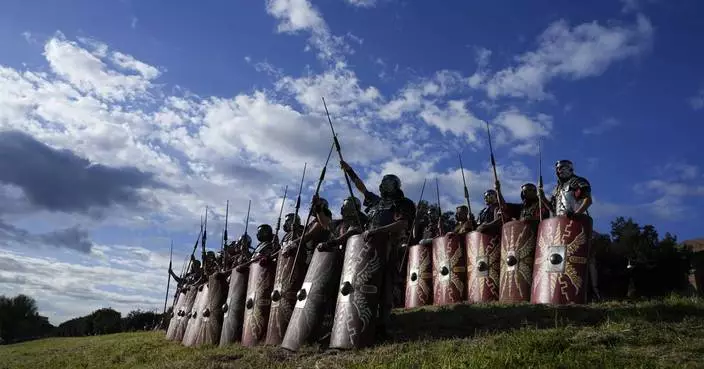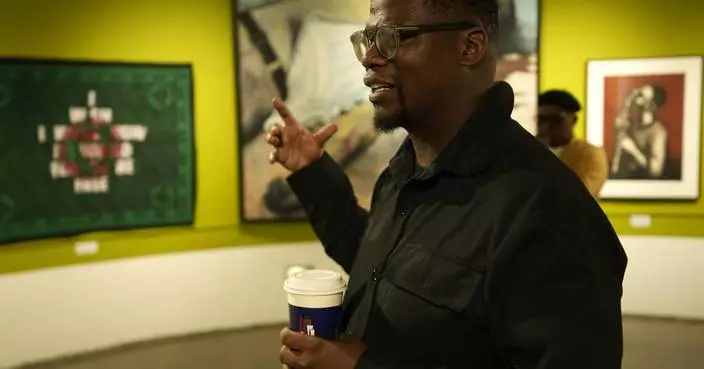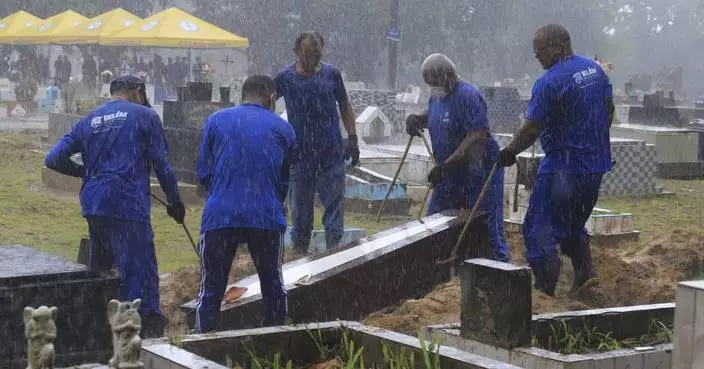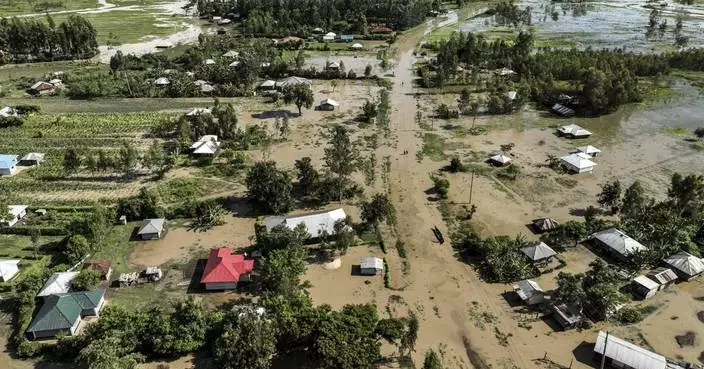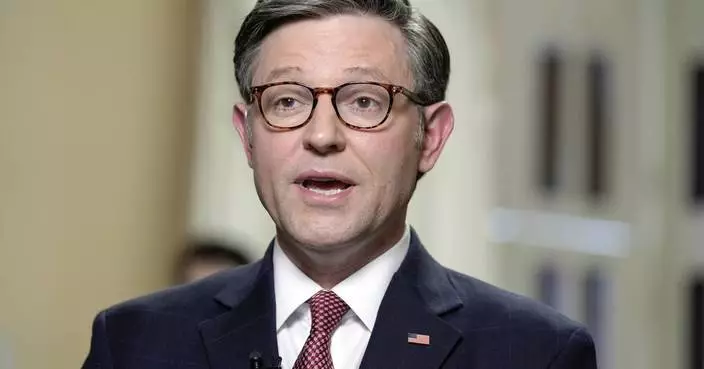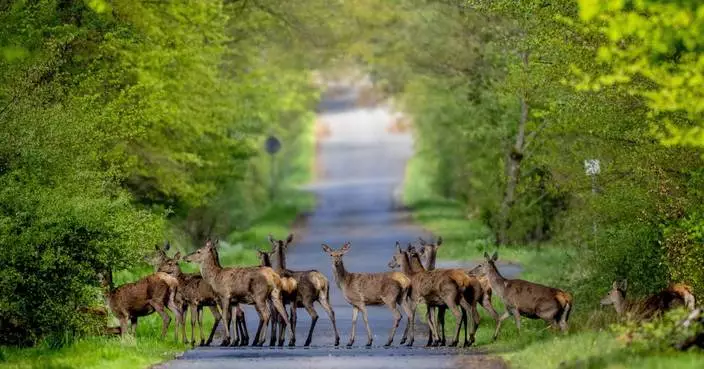"Black Panther" has burst onto the screen in Africa, handing a powerful response to the unfortunate remarks about the continent by President Donald Trump.
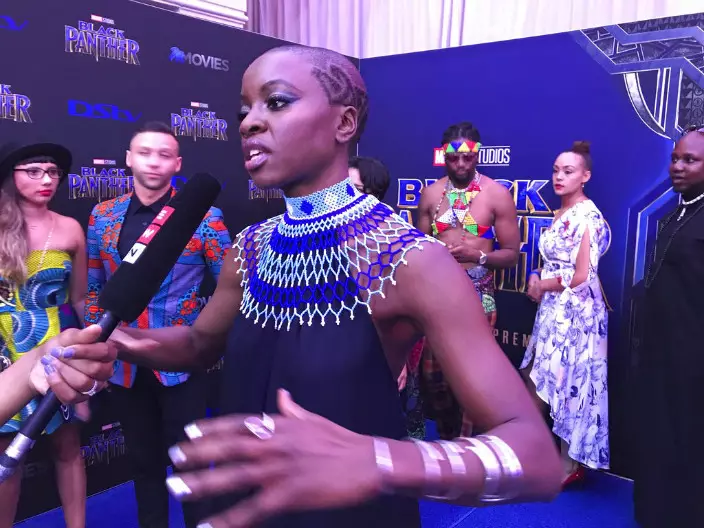
Danai Gurira speaks as the cast of “Black Panther” arrives at the South Africa premiere on Friday, Feb. 16, 2018, in Johannesburg. (AP Photo/Cara Anna)
As the red carpet in South Africa swirled with stunning outfits and exclamations in the local isiXhosa language used in the film's Wakanda kingdom, cast member John Kani laughed at the U.S. president's views, which several African nations have openly scorned. (Oscar-winning actress Lupita Nyong'o said simply: "No comment.")
The South African actor Kani, like many at Friday night's Johannesburg premiere, expressed pride at seeing an Afrofuturistic society that celebrates traditional cultures and dreams of what the world's second most populous continent can be.

The cast of “Black Panther” arrive at the South Africa premiere on Friday, Feb. 16, 2018, in Johannesburg. (AP Photo/Cara Anna)
"This time the sun now is shining on Africa," he said. "This movie came at the right time. We're struggling to find leaders that are exemplary and role models ... so when you see the Black Panther as a young boy and he takes off that mask you think, 'Oh my God, he looks like me. He is African and I am African. Now we can look up to some person who is African.'"
Added actress Danai Gurira, who grew up mostly in Zimbabwe: "To bring this film home is everything."
The film has opened in other top economic powers across Africa, where a growing middle class flocked to IMAX showings and shared vibrant opening-night images on social media.
"The African culture highlighted in the movie is so rich that it makes me feel proud of being black. I totally love it," said Liz Muthoni after a screening in Kenya's capital, Nairobi. "I can watch it again and again."
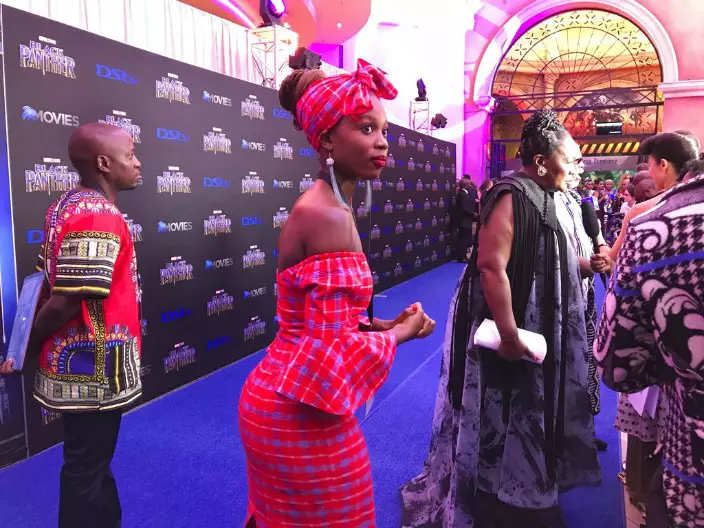
The cast of “Black Panther” arrive at the South Africa premiere on Friday, Feb. 16, 2018, in Johannesburg. (AP Photo/Cara Anna)
"Black Panther" screened a few days ago in Kenya's western city of Kisumu, where Nyong'o's father, Anyang, is the local governor.
"Sometimes we think that we have two choices to make in Africa," he wrote this month in The Star newspaper. "Choice one: We maintain our traditions and cultures and stay backward forever. Choice two: We modernize by becoming westernized and forgetting our cultural traditions which, by their very nature so we think, are stuck in the past. The experience of the Wakanda people teaches us otherwise."
In Ethiopia's capital, Addis Ababa, "Black Panther" has been selling out its five-times-a-day screenings at the only theater showing the film.
"Moviegoers are enjoying the African heritage part of the film. This is also unique for us because Ethiopia is often mentioned alongside the black power and black movements as the only nation not colonized by Western powers," said Elias Abraha, the cinema's operations chief. "There are people who changed their flight plans just to watch the movie."
Some Ethiopian fans quickly changed their Facebook profile pictures and expressed their adoration.
"Tears stream down my face as I write this," said one Facebook user who goes by LadyRock Maranatha. "Black Panther was basically an enormous . roller coaster of emotions, adventure and most of all the affirmation of what I had felt since I left my country for Cambridge and came back. I cried for my people and felt immense pride in being Ethiopian and most importantly AFRICAN. We are truly resilient and beautiful."
As the audience poured out of the Johannesburg screening, spirits were high.
"Totally blown away. I got emotional," said reality TV star Blue Mbombo, who admitted that going into the film she thought the expectations had been "hype." But she praised its use of cultural touches like Basotho blankets and called the use of the isiXhosa language "very humbling."
Others considered the American side of the story. "An African-American coming back to Africa, it's a nice reminder of their heritage as well," said Ayanda Sidzatane. She called the film awesome. "We knew it would be cool but not like this."
As Ghanaian celebrity blogger Ameyaw Debrah put it on social media: "What will #BlackPanther make the world think of Africa now?"
JOHANNESBURG (AP) — As 72-year-old Nonki Kunene walks through the corridors of Thabisang Primary School in Soweto, South Africa, she recalls the joy she and many others felt 30 years ago when they voted for the first time.
It was at this school on April 27, 1994, that Kunene joined millions of South Africans to brave long queues and take part in the country's first democratic elections after decades of white minority rule which denied Black people the right to vote.
The country is gearing up for celebrations Saturday to mark 30 years of freedom and democracy. But much of the enthusiasm and optimism of that period has subsided as Africa’s most developed economy faces a myriad of challenges.
Like many things in South Africa, the school that Kunene remembers has changed, and what used to be a school hall has now been turned into several classrooms.
“I somehow wish we could go back to that day, because of how excited I was and the things that happened thereafter,” said Kunene, referring to Nelson Mandela becoming the country's first Black president and the introduction of a new constitution that afforded all South Africans equal rights, abolishing the racially discriminative system of apartheid.
For many who experienced apartheid, those years remain etched in their collective memory.
“I cannot forget how we suffered at the hands of whites. In the city at night, there were white bikers with hair like this (describing a mohawk-like hairstyle) who would brutally assault a Black person if they saw them walking on a pavement. Those white boys were cruel," said 87-year-old Lily Makhanya, whose late husband died while working in the anti-apartheid movement’s underground structures.
"If they saw you walking on the pavement, you would be assaulted so badly and left for dead."
For Makhanya and many others who stood in those queues to vote in 1994, it represented a turning point from a brutal past to the promise of a prosperous future.
But 30 years later, much of that optimism has evaporated amid the country's pressing challenges. They include widening inequality as the country's Black majority continues to live in poverty with an unemployment rate of more than 32%, the highest in the world.
According to official statistics, more than 16 million South Africans rely on monthly welfare grants for survival.
Public demonstrations have become common as communities protest against the ruling African National Congress' failure to deliver job opportunities and basic services like water and electricity.
An electricity crisis that has resulted in power blackouts that are devastating the country's economy added to the party's woes as businesses and homes are sometimes forced to go without electricity for up to 12 hours a day.
Areas like the affluent Johannesburg suburb of Sandton, which hosts beautiful skyscrapers and luxurious homes, are an example of the economic success enjoyed by a minority of the country's 60 million people.
But the township of Alexandra, which lies a few kilometers (miles) from Sandton, is a stark reflection of the living conditions of the country's poor Black majority, where sewage from burst pipes flows on the streets and uncollected rubbish piles up on pavements.
Such contradictions are common across the major cities, including the capital Pretoria and the city of Cape Town, and they remain at the center of what is expected to be one of the country's most fiercely contested elections in May.
For the first time since the ANC came to power in 1994, polls are indicating that the party might receive less than 50% of the national vote, which would see it lose power unless it manages to form a coalition with some smaller parties.
For some younger voters like 24-year-old Donald Mkhwanazi, the nostalgia does not resonate.
Mkhwanazi will be voting for the first time in the May 29 election and is now actively involved in campaigning for a new political party, Rise Mzansi, which will be contesting a national election for the first time.
“I had an opportunity to vote in 2019, and in local elections in 2021, but I did not because I was not persuaded enough by any of these old parties about why I should vote,” he said.
“I didn't see the need to vote because of what has been happening over the past 30 years. We talk about freedom, but are we free from crime, are we free from poverty? What freedom is this that we are talking about?"
Political analyst Pearl Mncube said South Africans are justified in feeling failed by their leaders.
“More and more South Africans have grown skeptical of pronouncements from government due to its history of continuously announcing grand plans without prioritizing the swift execution of said plans,” Mncube said.
She said while Freedom Day is meant to signify the country’s transition from an oppressive past, it was important to highlight current problems and plans to overcome them.
“We cannot use the past, and any nostalgia attached to it, to avoid accounting for the present,” she said.
AP Africa news: https://apnews.com/hub/africa
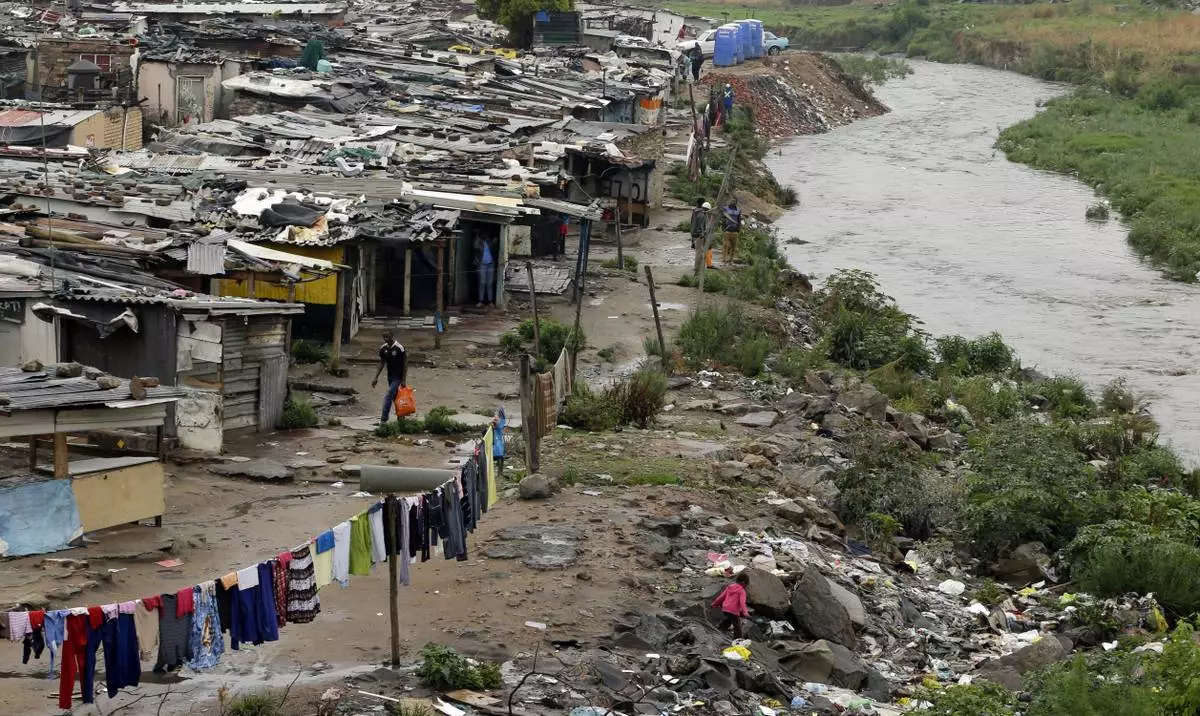
FILE — A man walks along an informal settlement as a young girl plays next to the polluted Jukskei River in Alexandra, northern Johannesburg, South Africa Nov. 11, 2014. On Saturday, April 27, 2024 the country will celebrate Freedom Day when In 1994 people braved long queues to cast votes after years of white minority rule which denied Black South Africans the right to vote. (AP Photo/Themba Hadebe/File)
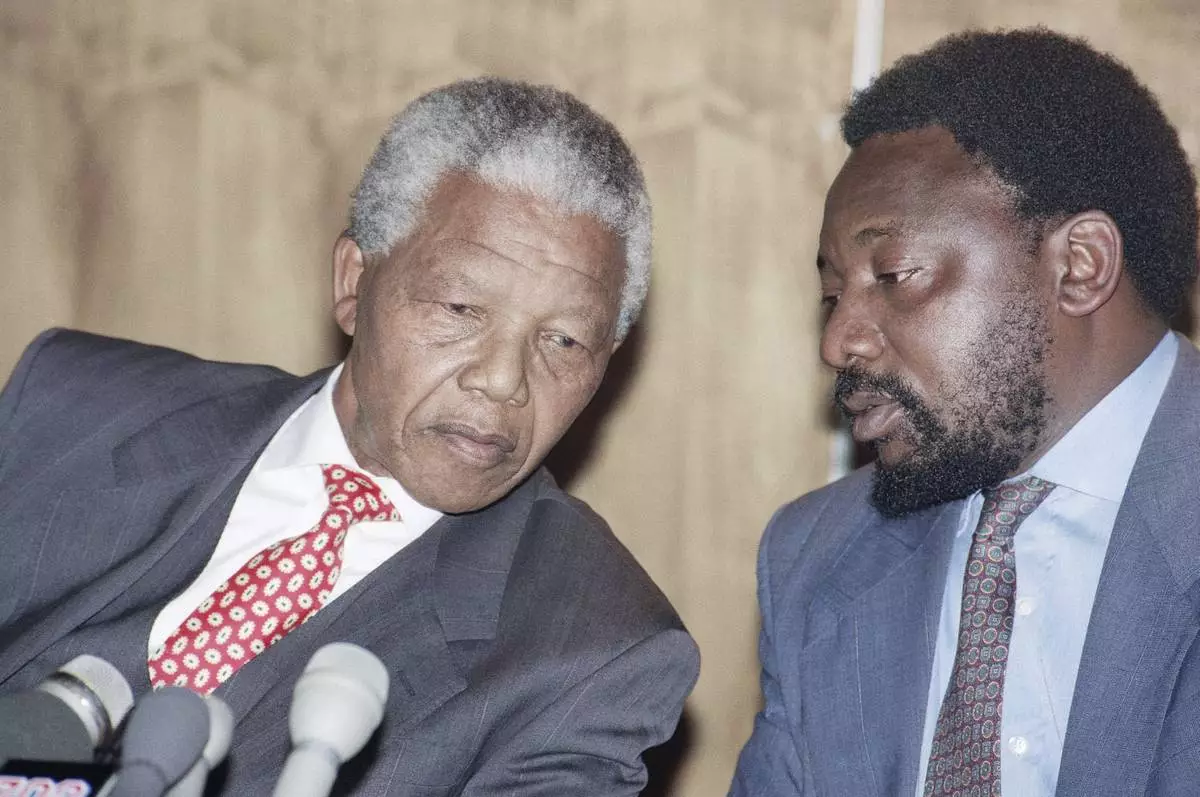
FILE — Then African National Congress President Nelson Mandela, left, and secretary general Cyril Ramaphose, now South African President, right, at a news conference in Johannesburg Monday, August 30, 1993. On Saturday, April 27, 2024 the country will celebrate Freedom day when In 1994 people braved long queues to cast votes after years of white minority rule which denied Black South Africans the right to vote. (AP Photo/Denis Farrell/File)
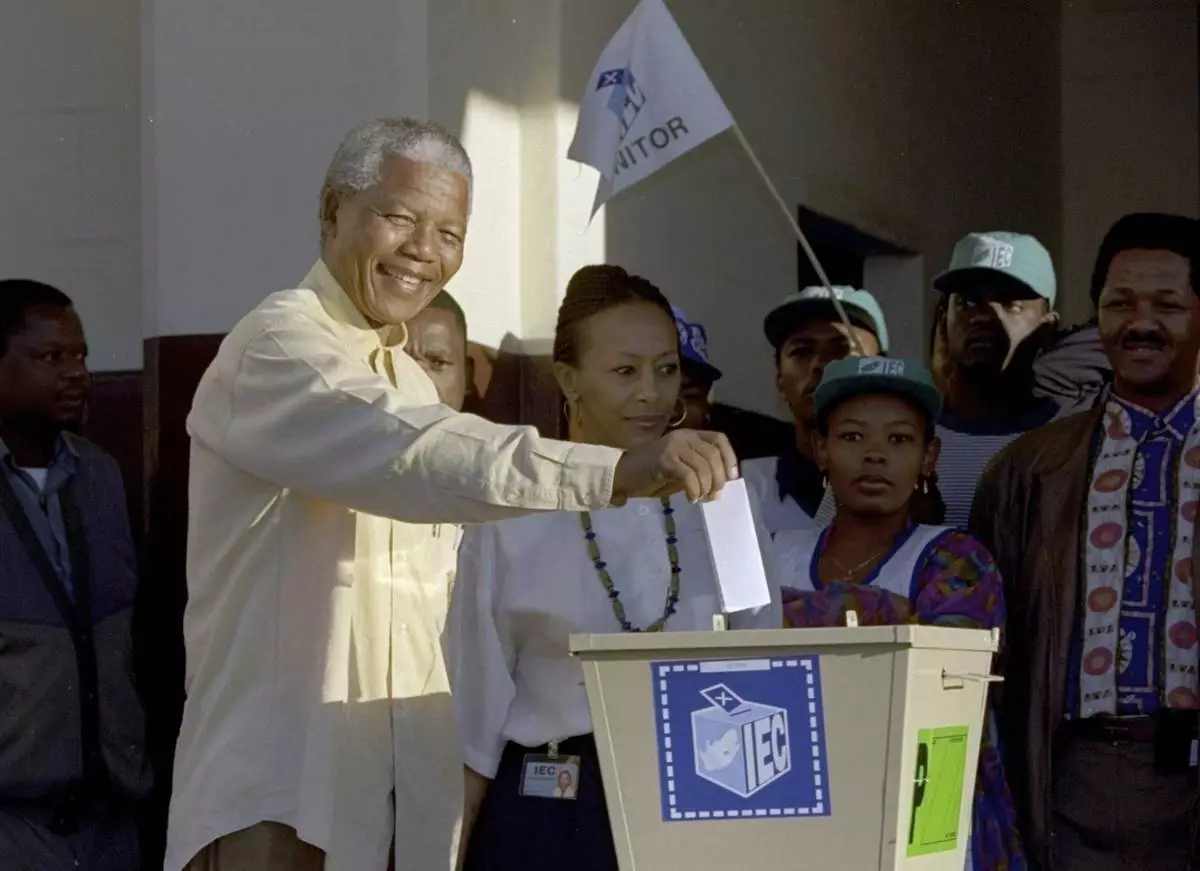
FILE - Then African National Congress leader, Nelson Mandela casts his vote April 27, 1994 near Durban, South Africa, in the country's first all-race elections. In 1994 people braved long queues to cast votes after years of white minority rule which denied Black South Africans the right to vote. (AP Photo/John Parkin. File)
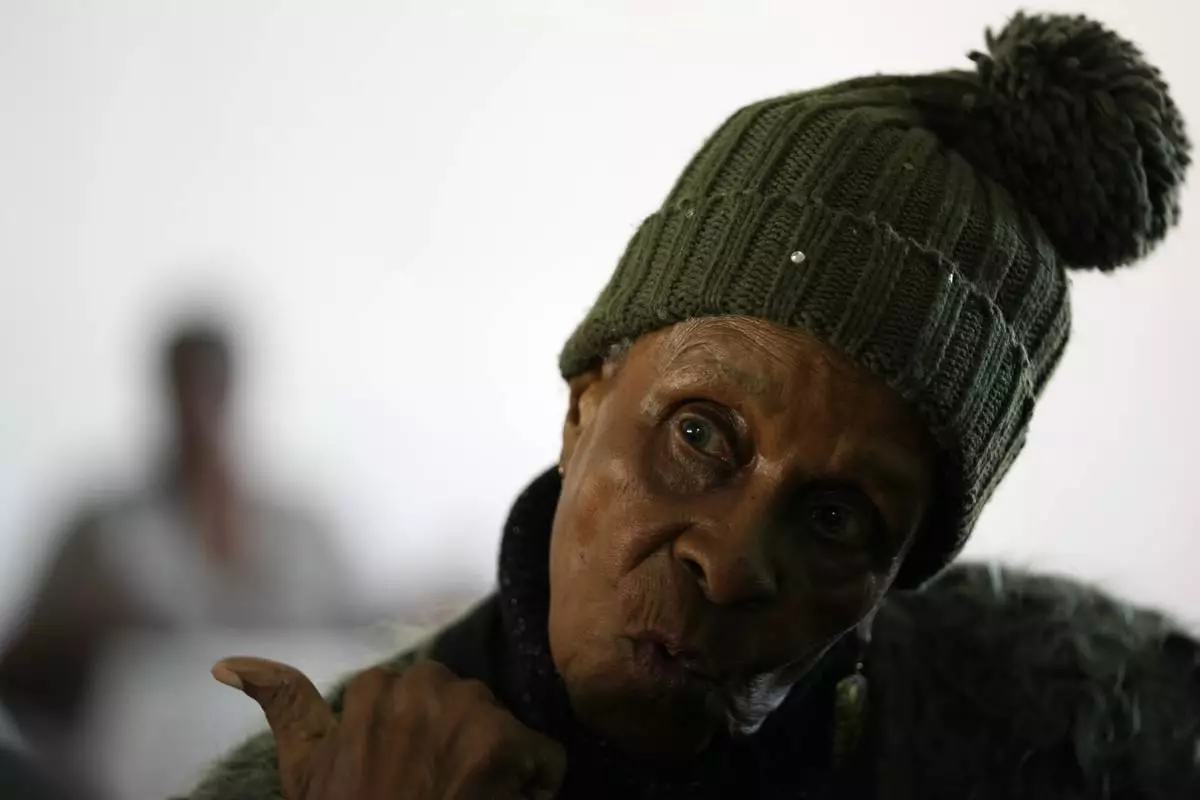
Nonki Kunene during an interview with The Associated Press in Soweto, South Africa, Monday, April 22, 2024. Thirty years ago Kunene joined thousands of South Africans who braved long queues to cast a vote in South Africa's first ever elections after years of white minority rule which denied Black South Africans the vote. (AP Photo/Themba Hadebe)
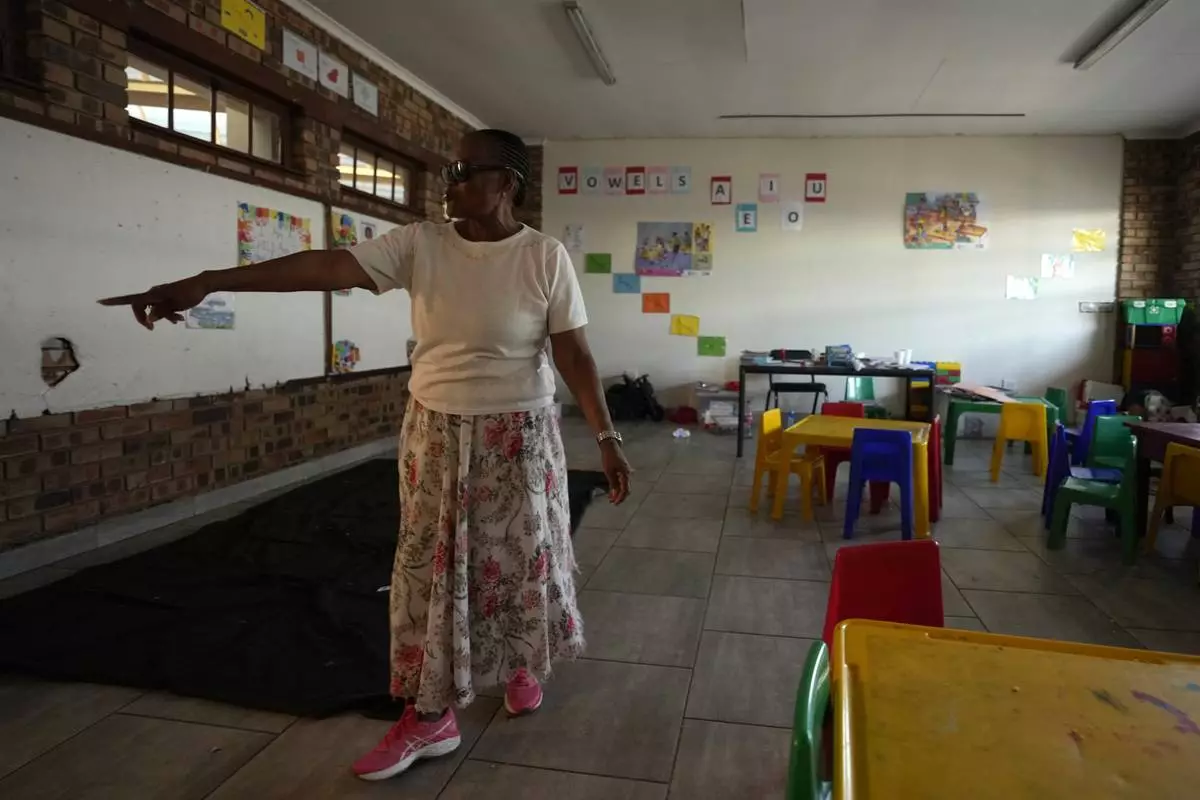
Lily Makhanya at the Thabisang Primary School where she voted for the first time 30 years ago, in Soweto, South Africa, Monday, April 22, 2024. In 1994 Makhanya joined thousands of South Africans who braved long queues to cast a vote in South Africa's first ever elections after years of white minority rule which denied Black South Africans the vote. (AP Photo/Themba Hadebe)
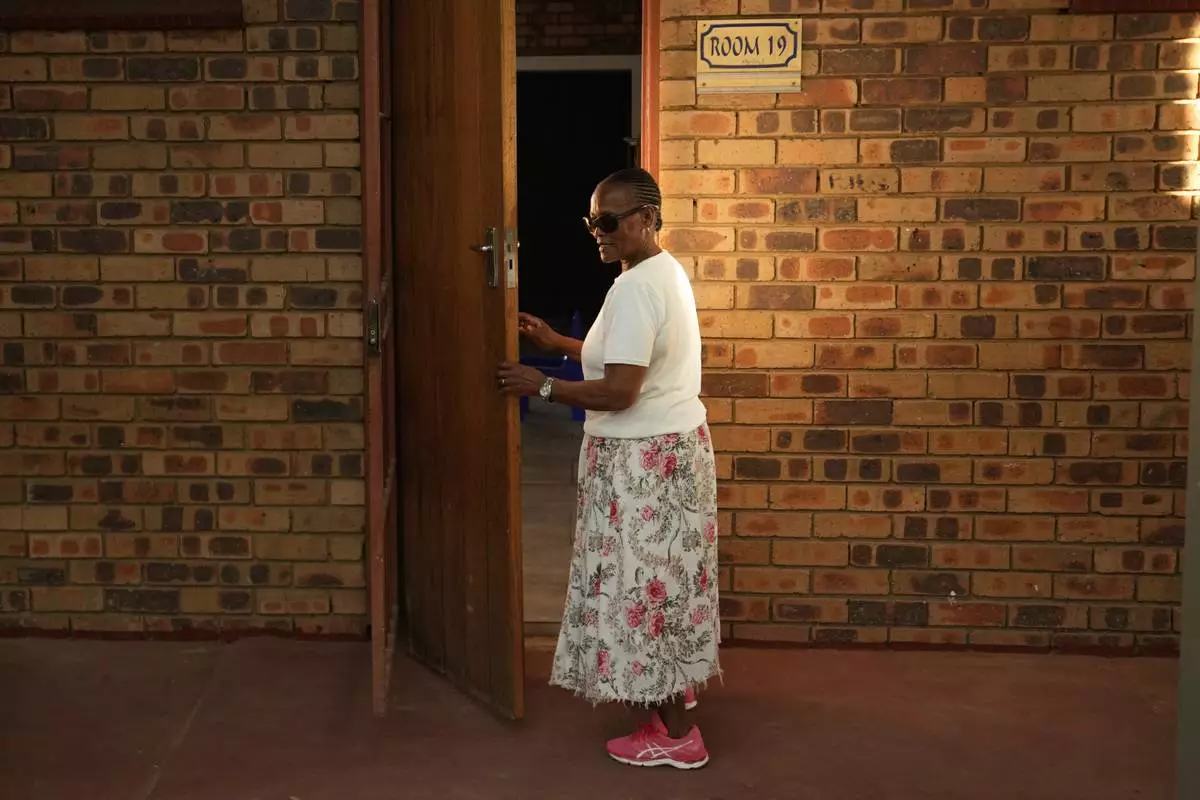
Lily Makhanya opens the classroom door at Thabisang Primary School where she voted for the first time 30 years ago, in Soweto, South Africa, Monday, April 22, 2024. In 1994 Makhanya joined thousands of South Africans who braved long queues to cast a vote in South Africa's first ever elections after years of white minority rule which denied Black South Africans the vote. (AP Photo/Themba Hadebe)
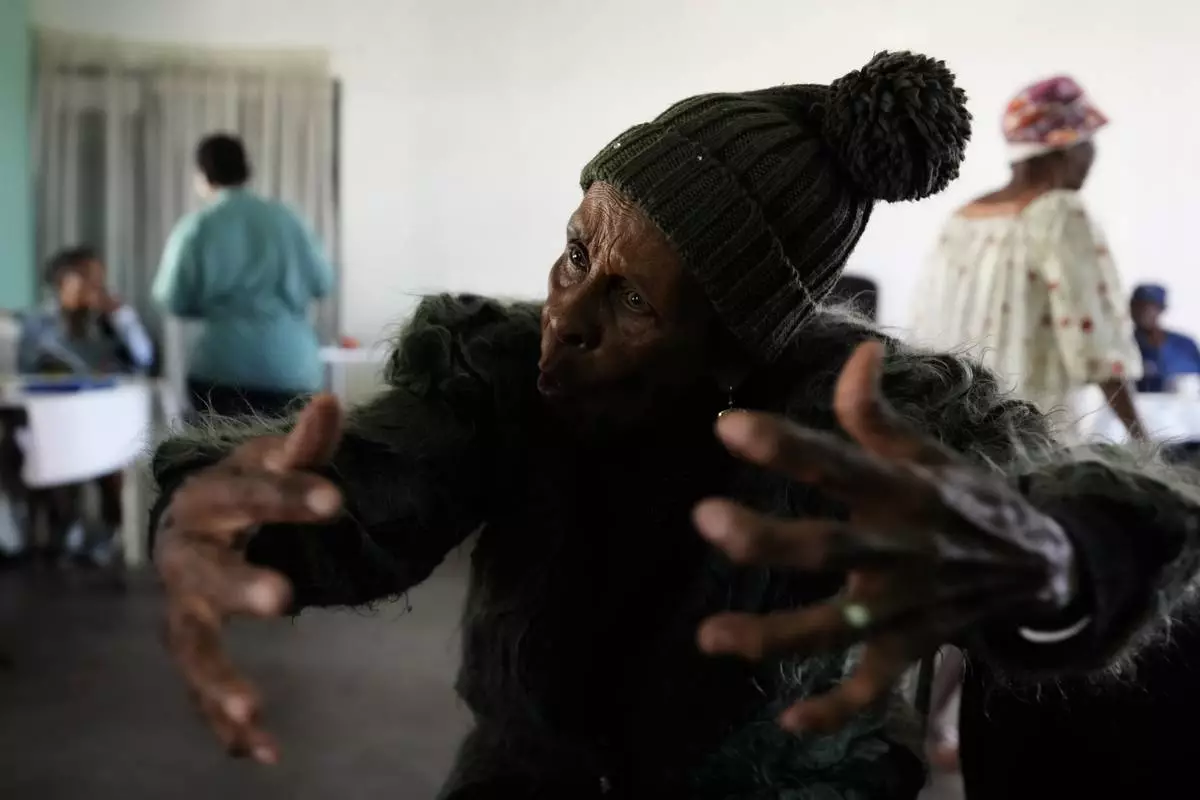
Nonki Kunene during an interview with The Associated Press in Soweto, South Africa, Monday, April 22, 2024. Thirty years ago Kunene joined thousands of South Africans who braved long queues to cast a vote in South Africa's first ever elections after years of white minority rule which denied Black South Africans the vote. (AP Photo/Themba Hadebe)
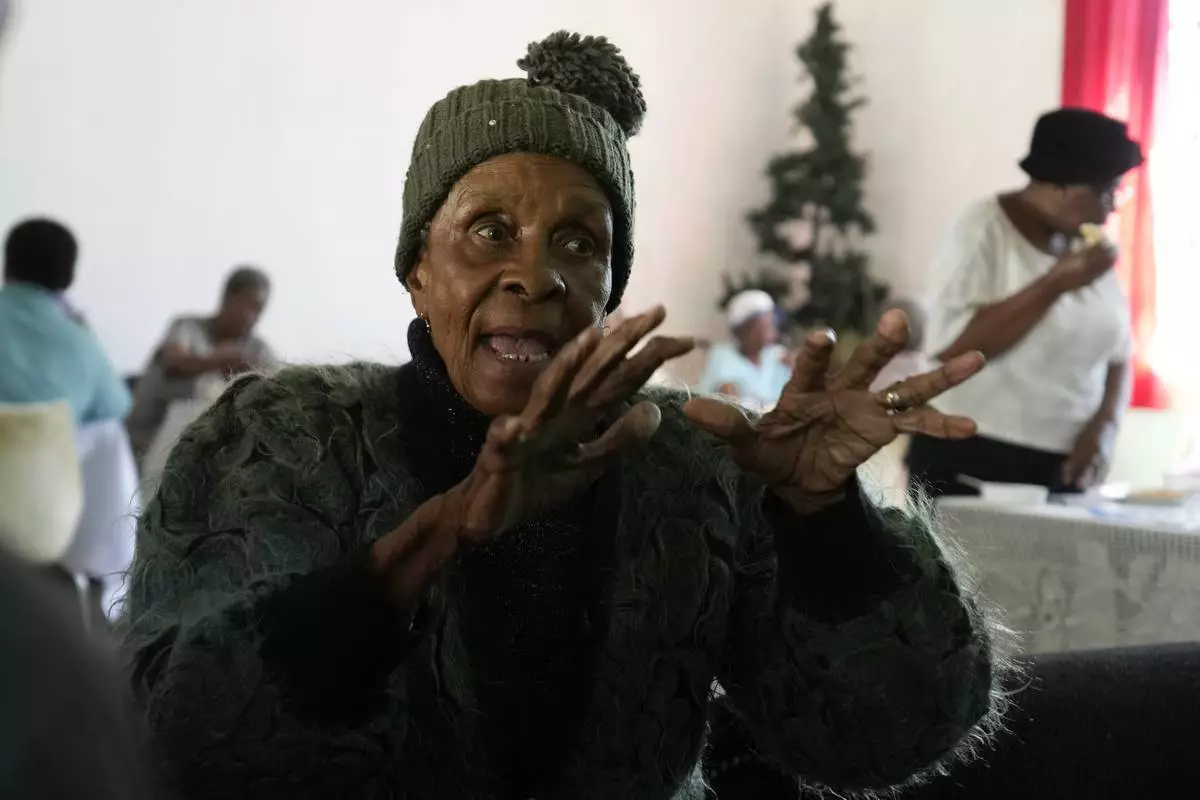
Nonki Kunene during an interview with The Associated Press in Soweto, South Africa, Monday, April 22, 2024. Thirty years ago Kunene joined thousands of South Africans who braved long queues to cast a vote in South Africa's first ever elections after years of white minority rule which denied Black South Africans the vote. (AP Photo/Themba Hadebe)
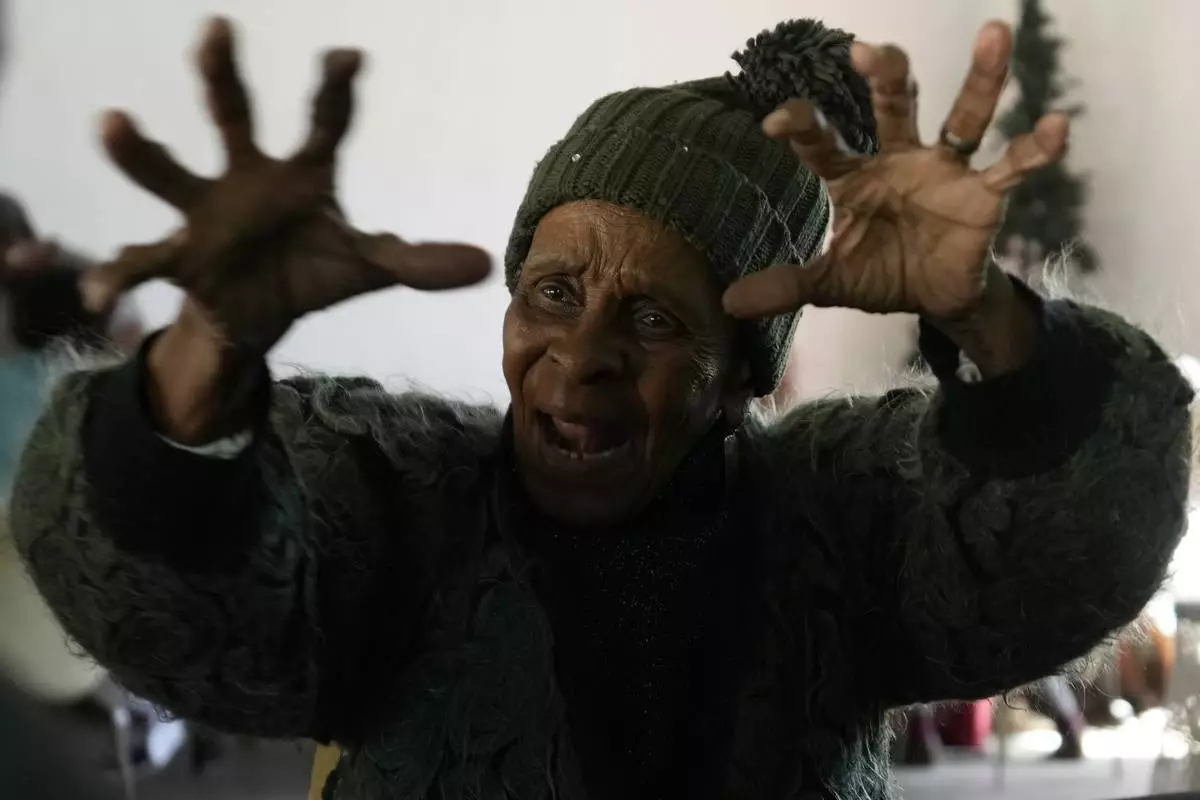
Nonki Kunene during an interview with The Associated Press in Soweto, South Africa, Monday, April 22, 2024. Thirty years ago Kunene joined thousands of South Africans who braved long queues to cast a vote in South Africa's first ever elections after years of white minority rule which denied Black South Africans the vote. (AP Photo/Themba Hadebe)
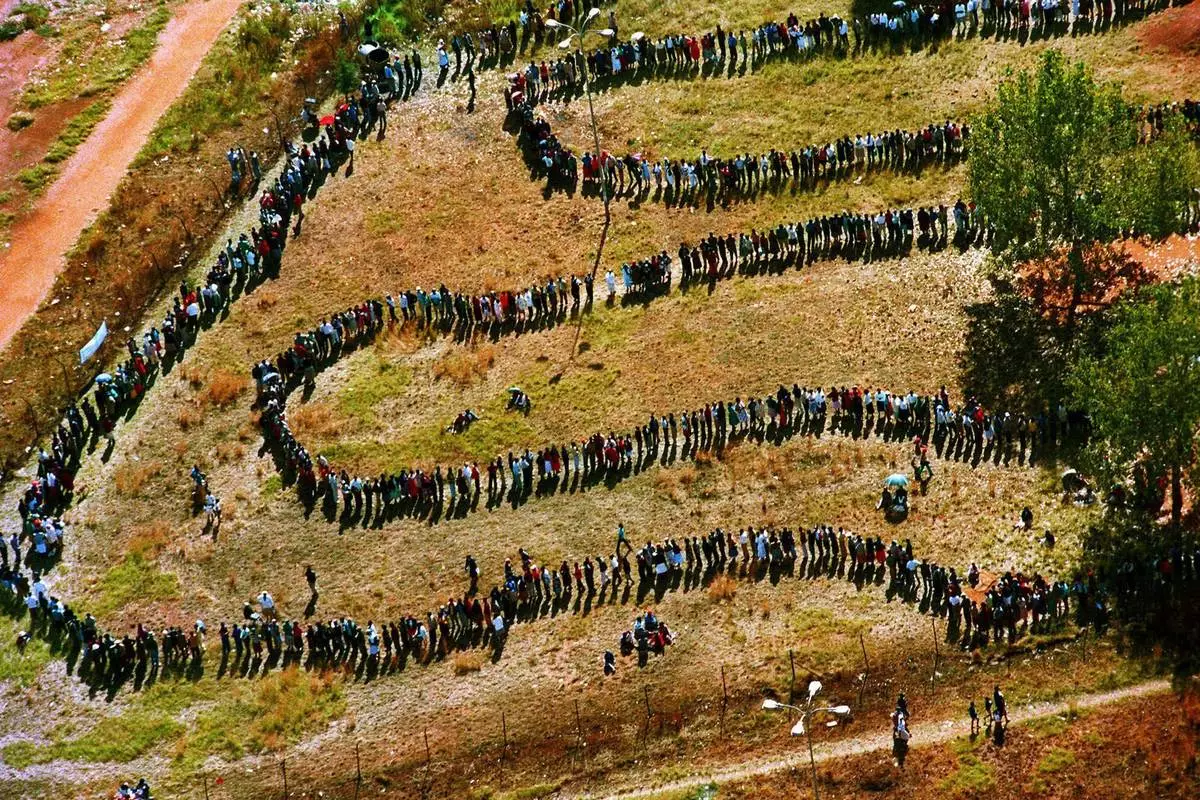
FILE - People queue to cast their votes In Soweto, South Africa April 27, 1994, in the country's first all-race elections. In 1994 people braved long queues to cast a vote after years of white minority rule which denied Black South Africans the vote. (AP Photo/Denis Farrell. File)
















